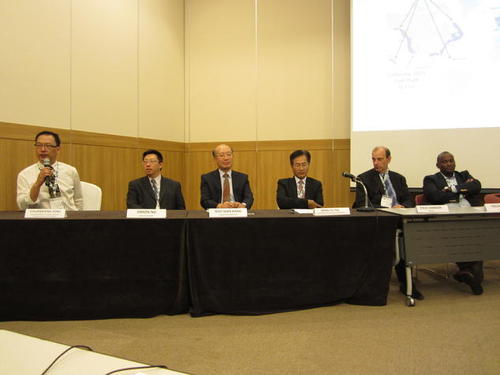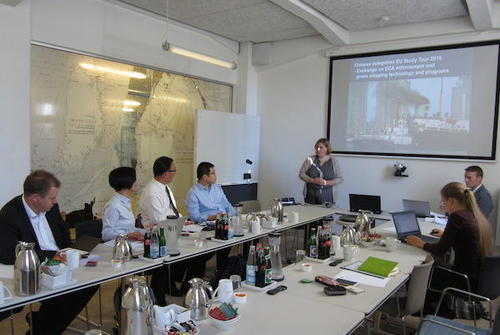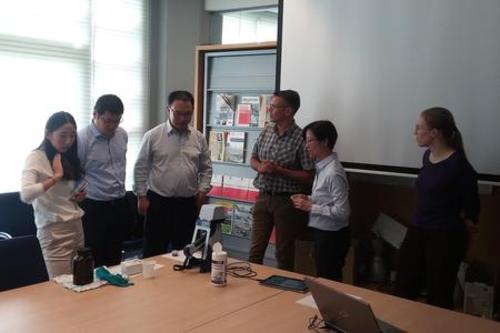October 1st is China’s National Day, but this year it also marked an important day for controlling shipping pollution: Shenzhen, the world’s third biggest container port, started early enforcement of China’s national Domestic Emission Control Area (DECA) regulations. That is, Shenzhen has joined five other Chinese clean ports - Shanghai, Ningbo-Zhoushan, Suzhou, Nangtong, and Hong Kong - to mandate ships use fuels with no more than 0.5% sulfur content while at berth. Shenzhen, Shanghai, Hong Kong, and Ningbo-Zhoushan ports are among the world’s busiest, and together they handled over 100 million twenty-foot equivalent unit (TEU) containers in 2014, which is similar to the annual container volume of all EU ports combined and twice as much as all U.S. ports. The thousands of ships calling at these Chinese ports every day must now use fuels with 80% less sulfur. Beginning on January 1, 2017, the DECA regulations will go into effect for all of China’s eleven core ports.
China is not just targeting its clean air efforts on Ocean-Going Vessels (OGVs); it also started regulating air pollution from domestic vessels (inland and Chinese-flag fishing and coastal vessels). In late August, China adopted its first-ever regulatory standards for controlling air emissions from engines used on domestic vessels. With over 160,000 inland vessels in operation, China has the world’s largest inland vessel fleet, but air emissions from these vessels have been essentially uncontrolled due to a lack of regulation. The adopted engine emission standards will, for the first time, drive the adoption of engine technologies that can better control emissions from domestic ships.
A recent study found that oceangoing ships alone causes nearly 18,000 premature deaths per year in mainland China, and this estimate does not include the health impacts of air pollution from inland and coastal shipping. So China’s national DECA regulations, the accelerated adoption of DECA at the local level, and regulations to clean up its domestic vessel fleet, are important steps for mitigating the health impacts of shipping on its citizens.
China Inspiring Other Asian Countries to Act
China’s actions have also inspired other Asian countries to act. During a session on “Managing Air Quality in Port Cities” jointly organized by NRDC, Clean Air Asia, and the United Nations Environment Programme (UNEP) at the 2016 Better Air Quality (BAQ) Conference held in Busan, South Korea, a representative from the Port of Busan noted that the Korean government is seriously looking into setting up an emission control area for ships, similar to China’s DECA. In addition, a number of port cities, including Busan, Kaohsiung, and Hong Kong, are making efforts to clean up port-related air pollution by electrifying cranes, converting diesel-fueled yard trucks to natural gas, offering onshore power supply, providing incentives to promote green shipping, and experimenting with the use of solar energy for powering port facilities, among other exciting initiatives. UNEP has also sponsored the completion of emission inventories at Tanjung Priok Port in Jakarta, Indonesia that will help officials choose the emission control measures that best suit the port’s situation.
Innovative Enforcement Approaches in Europe
To both ensure that the promised benefits of DECA will materialize and maintain a level playing field, China is working hard to enhance its DECA enforcement capacity. In early September, two researchers from the Waterborne Transport Research Institute of the Ministry of Transportation (MOT) of China participated in a study tour in Denmark and the Netherlands that was organized by NRDC in cooperation with the Royal Danish Embassy in Beijing. During the five-day tour, the researchers met with officials from the Danish Maritime Authority, Danish Environmental Protection Agency, and Netherlands Shipping Inspectorate, as well as leading researchers who are developing remote measurement tools, to learn how advanced technologies, such as remote measurement and instantaneous fuel sulfur analyzers, are being used to monitor ship emissions and screen fuel sulfur content, which help effectively and efficiently enforce EU’s SOx Emission Control Area (SECA) regulation.
The researchers also visited two manufacturers that produce marine engine and emission control devices for the marine sector in Denmark, spent a full day with officials from the Port of Rotterdam Authority, and met with the Green Award program (which audits and certifies vessels to stimulate safe and green shipping) to better understand the latest development of management systems and technologies for reducing air pollution in goods movement systems (ships, port equipment, locomotives, and trucks), as well as various incentive programs for promoting safe, green, and efficient goods movement systems.
Since the Yangtze River Delta started implementing the DECA regulations in April, the Maritime Safety Administration (MSA) of Shanghai, Jiangsu, and Zhejiang have already caught dozens of ships not complying with the DECA regulations (also see here, here, and here) through onboard inspections of documents and testing of fuel samples. However, the large number of ships calling at China’s ports- for instance, over 68,000 OGVs call at the Port of Shanghai every year versus 28,000 OGVs at the Ports of Rotterdam, Europe’s largest port - requires a more efficient way to target enforcement efforts on ships that have higher potential for non-compliance.
The National MSA of the MOT, which oversees and guides DECA enforcement for all ports in mainland China, is currently evaluating other methods to improve the enforcement of existing DECAs. The two researchers participating in the study tour mentioned above are providing technical support to MSA’s enforcement program, so the study tour offered timely opportunities to learn about international best practices that could be quickly adopted and tailored to best suit China’s needs and helped establish a channel for future communications and exchange among officials and relevant stakeholders in China and the EU.
Strengthening the Global Marine Fuel Sulfur Cap
On the global front, to combat shipping pollution, the International Maritime Organization’s Marine Environment Protection Committee (IMO MEPC) will decide later this month whether to implement a stricter global marine fuel sulfur cap of 0.5% in 2020, or to delay implementation to 2025. Some players in the industry have raised concerns that implementing the stricter global cap in 2020 may result in an initially weak enforcement regime, as many nations seem not yet ready. The industry is also concerned that refineries do not have enough time to adjust to production and deliver sufficient amount of low sulfur fuel if the stricter cap is implemented in 2020. However, a five-year delay would have significant public health consequences, causing an additional 200,000 premature deaths from lung cancer and heart diseases, according to an unpublished IMO-commissioned study. China would be among the countries hardest hit by such delay.
China’s current efforts to develop a robust DECA enforcement program would prepare the country well for enforcing the global cap. Its experiences in establishing a strong enforcement capacity would also be valuable for other countries that have not yet regulated shipping pollution.
Aside from the previously mentioned BAQ conference and European study tours that we organized, NRDC has also provided a series of fuel regulation enforcement training workshops. In order to support timely implementation of the 0.5% sulfur cap in 2020, we are ready to assist port cities all over the world in sharing best practices.
This post was co-authored with my colleagues Freda Fung and Zhixi Zhu.




